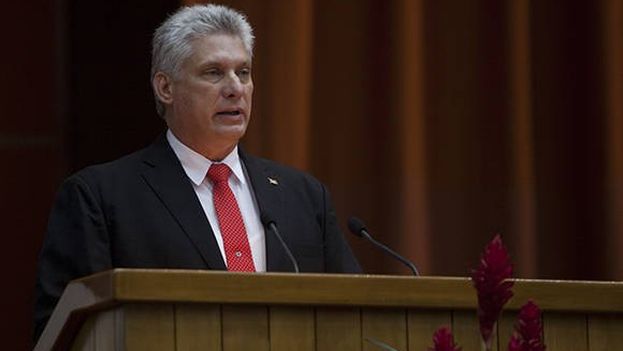
![]() 14ymedio, Carlos Malumud, Madrid, 23 April 2018 — The transfer of power at the highest level gave rise to a lively debate about the nature and depth of change in Cuba. The predominant Lampedusian* line insists that despite the rise of Miguel Díaz-Canel and the stepping aside by Raúl Castro, little or nothing has changed. A more optimistic version believes that this may be the beginning of relevant transformations. However, along with the magnitude of the share of power effectively ceded by Castro, lies the legitimacy and survival of the revolutionary experience.
14ymedio, Carlos Malumud, Madrid, 23 April 2018 — The transfer of power at the highest level gave rise to a lively debate about the nature and depth of change in Cuba. The predominant Lampedusian* line insists that despite the rise of Miguel Díaz-Canel and the stepping aside by Raúl Castro, little or nothing has changed. A more optimistic version believes that this may be the beginning of relevant transformations. However, along with the magnitude of the share of power effectively ceded by Castro, lies the legitimacy and survival of the revolutionary experience.
The feeling that time has been systematically wasted to end up getting nowhere is an essential element of the daily reflection of many Cubans. The poet Rafael Alcides, still self-exiled, wrote in 1970: “The past and the future have already passed. / Everything we had we lost / and it was more of what we could have.” The troubadour Ray Fernández also insists that in the current context there is no future and he sings in El Bucanero: “Forget the treasure / because we lost the map.” So important is time in Cuba that from the beginning of the official discourse everything positive begins with the Revolution, and before that the island was only a brothel marked by vice, backwardness and exploitation.
That is why many people inside and outside of Cuba wonder if the fact that a Castro is not leading the government, or that the new president is not a military man and was born after the Revolution, will make a difference. Could Diaz-Canel make up for lost time and lead his people to the Promised Land? Attending to their protests will be difficult, especially if he thinks of political reforms oriented to democratizing the regime.
The new president has recognized the hegemony of the Revolution in line with Article 5 of the Constitution, which establishes the supremacy of the Communist Party, “the highest leading force of society and the State.” He has also emphasized the leadership of Raul Castro in the next stage, who will continue to spearhead “the decisions for the present and the future of the nation.”
The economic situation and the well-being of Cubans will be an essential question in this new stage. In regard to these issues, Diaz-Canel will put into play a good part of his prestige and authority. And here, as on another open front, nothing will be easy, especially since the collapse of aid from Venezuela. The demonstrations in Nicaragua, violently repressed by the Ortego-Murilla couple, are strong proof of this.
The principal alibi of the Cuban government, reinforced by the presence of Trump, is once again the United States. The anti-imperialist rhetoric and the effects of the ‘blockade’ will again justify the lack of reforms or their paralysis. But the only ones responsible for the political policies put at the service of their society are Cuba’s rulers. They must decide and execute even if the price paid is painful and until now the fear of a social reaction has been more a brake than a stimulus. Can Diaz-Canel advance where Raúl Castro did not?
Translator’s note: “In political science terminology, ‘gatopardism’ or ‘lampedusian’ are often used to refer to seemingly revolutionary policies and institutional changes that in practice only superficially alter power structures whilst retaining the primary elements that prompted transformation in the first place.”[Rubén Guzmán-Sánchez and Alejandro Espriú-Guerra] The term is a reference to Giuseppe Tomasi di Lampedusa and his novel The Leopard (“Il Gattopardo” in Italian).
__________________________
Note from the Editor: this analysis has been previously published in El Heraldo de México. We reproduce it with the authorization of the author.
The 14ymedio team is committed to serious journalism that reflects the reality of deep Cuba. Thank you for joining us on this long road. We invite you to continue supporting us, but this time by becoming a member of 14ymedio. Together we can continue to transform journalism in Cuba.
